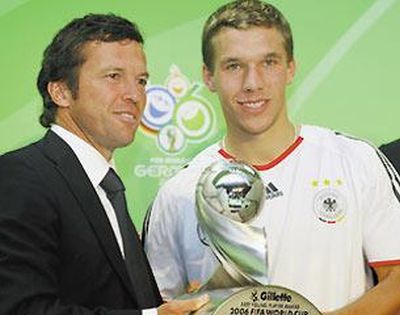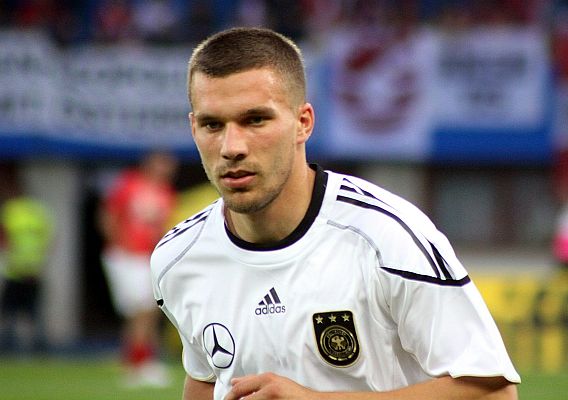From Cologne to the World: Lukas Podolski and the 2006 World Cup by Jake McGhee
Germany, The host nation of the 2006 World Cup, entered the competition with moderate expectations, but a squad packed with household names and upcoming sensations.
Miroslav Klose, Philipp Lahm and Michael Ballack were touted to be the most exciting players in Die Mannschaft’s illustrious ranks, but one young man who wasn’t even born in Germany would go on to capture the hearts of a nation – Lukas Podolski.
With the city of Cologne already firmly in admiration of the young striker, Lukas surely would’ve eyed the World Cup as an opportunity to take his local acclaim to international heights.
In 13 previous call-ups, the barely 21-year-old international had found the net 7 times, and the entire nation was hoping his red-hot form would transpire onto the World Cup’s stage.
Following his 3 years of Bundesliga stardom at boyhood club FC Köln, none other than Bayern Munich were hot on the heels of the young talisman, and what better platform for Lukas to prove his talents than a World Cup on home soil.
As part of a striking duo with none other than the competition’s soon-to-be top scorer Miroslav Klose, Podolski was in good company, and the veteran forward was the ideal figure to pass on his poaching knowledge to young Lukas.
Placed in a group with Costa Rica, Ecuador, and Lukas’ motherland of Poland, Germany were confident of progressing into the knockout stages, and Lukas would’ve seen these fixtures ahead of time as an opportunity to shine.
Even after being kept off the scoresheet in the first 2 matches against Costa Rica and Poland, Podolski still managed to show glimpses of what he was capable of: testing the goalkeeper, using his physicality to drive at opposition defences, and making highly intelligent attacking runs that often left him unmarked at the back post.
It was a real feeling of ‘when rather than if’ when talking about Podolski grabbing a goal. If he kept popping up in these positions, opening his account wouldn’t be far away… and so it proved.
In the 3rd game of Germany’s group stage they lined up against Ecuador.
Holding a 2-0 lead courtesy of a Miroslav Klose brace the Ecuadoreans looked to fire back with a chance from a crossing position. Play quickly turned over following a block and the counterattack was on.
The Germans surged up the park with Lukas Podolski holding his run ever so slightly.
As Bastian Schweinsteiger drove into the heart of the midfield Bernd Schneider peeled off onto the right-hand flank and availed himself for a ball that quickly came his way.
Clear of his marker, Schneider drove towards the box and had a quick glance up to see none other than Podolski ghosting into the penalty area.
By the time the Ecuadorian center back noticed the young German had peeled away it was far too late to intervene.
Schneider delivered an inch-perfect ball into the danger area and Lukas Podolski slid to poke home an excellent finish into the far corner, leaving the goalkeeper stranded as he wheeled away in celebration.
A whole nation rejoiced in unison as their starlet finally found his feet at the World Cup, and the city of Cologne, in particular, felt the most bittersweet of happiness, knowing that such goals wouldn’t be celebrated as often when Podolski was poached away by Bayern the following season.
Into the Round of 16 and drawn against Sweden, the Germans looked to keep pushing on and overcome the Scandinavian nation.
In his soon to be home, the Allianz Arena, Lukas Podolski was again in the starting 11 and looked hungry from the get-go to bag more goals for his country.
On just the 4 minute mark, Miroslav Klose burst through the back line and found himself face to face with the onrushing Swedish stopper Andreas Isaksson. The Swede dove at the feet of the striker and parried the ball back out to a smartly positioned Podolski who happily drilled home.
His knack of knowing where to be finally paid off as he grabbed his 2nd goal in as many games.
Just 2 minutes later, finding himself in a central position, Podolski unleashed his cannon of a left foot from 25 yards out and narrowly missed scoring an all-time great WC goal. Like any great striker though, he didn’t dwell on his missed chance and picked himself up to go again.
Only 6 minutes later, Podolski grabbed his second of the game, and third of the tournament, with a sensational reverse run to ghost in behind Klose and the helpless Swedish backline.
Finding himself one-on-one with the goalkeeper, Lukas produced an ice-cold side-footed finish to push Germany’s lead to two. He continued to be a real threat to the Swedes until he was swapped out for Oliver Neuville in the 74th minute putting a dream day at the Allianz to bed.
Into the quarter finals, Germany was faced with the task of dispatching a Crespo-led Argentina. Certainly not an easy feat.
With the Argentinians carrying a 1-goal lead and coming into the closing stages of the game, Miroslav Klose handed the Germans a lifeline as he scored a trademark header on the 80th-minute mark to reignite hope amongst the host nation.
Into extra time, the game continued to be nervy and eventually led to a penalty shootout.
The 2 nations went tit for tat until Roberto Ayala stepped up for the Argentines and was denied by Jens Lehmann. Lukas Podolski took over the initiative next with the opportunity to send the Germans into a comfortable advantage, and he clearly wasn’t phased by the pressure of a whole nation as he rifled the ball home into the bottom right corner.
Germany would go on to progress 4-2 on penalties as Lehmann produced another heroic save to deny Javier Mascherano.
In the semi-finals, the Italians stood in wait for Germany. A tense 0-0 game deep into extra time looked to be headed to penalties when Fabio Grosso handed the Italians a last-gasp lead in the 119th minute before Alessandro Del Piero put the game to bed with another in the 121st minute to break German hearts.
This would spell the end of Germany and Podolski’s World Cup dreams.
Both country and starlet would need to wait 8 more years to ultimately lift a world title, but at least for Podolski, there would be some silverware to take home.
Podolski was awarded the prestigious Young Player of the Tournament by FIFA, piping some light opposition in the form of Lionel Messi and Cristiano Ronaldo to the award.

Following this World Cup Lukas Podolski’s career really kicked on, and 16 years later the not-so-young Podolski is in the eclipse of his career in Poland and has retired internationally, winning a World Cup in 2014, and ending his career as the 3rd most capped and 3rd highest goal scorer in German history.







